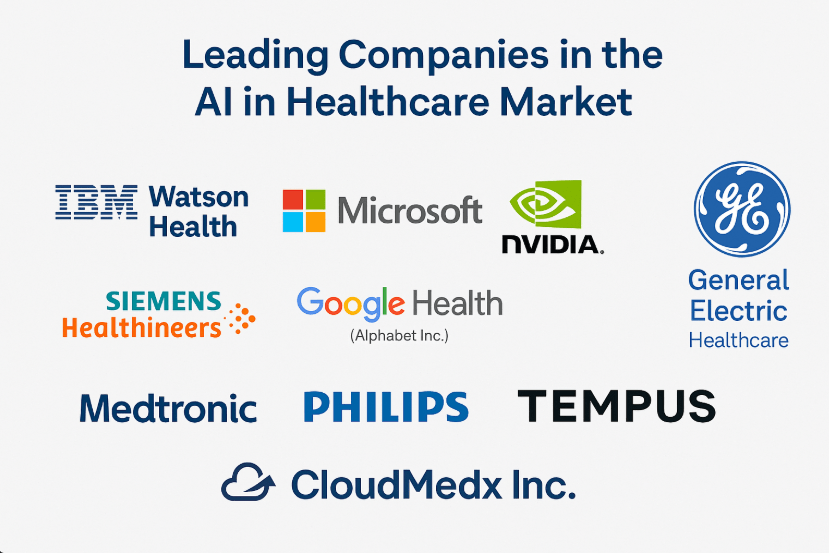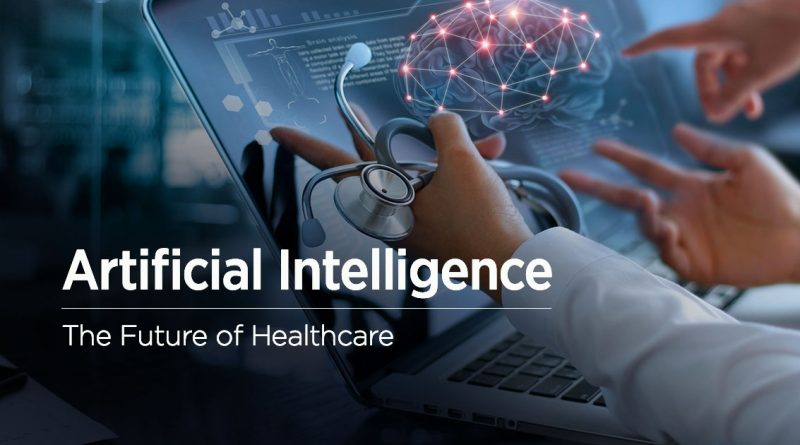Artificial Intelligence in Healthcare Market Companies and Developments
The global artificial intelligence in healthcare market is rapidly expanding, powered by innovative technologies and strategic collaborations. Major companies such as Intel, Philips, IBM, Microsoft, Nvidia, and GE Healthcare are leading the way, integrating AI into diagnostics, patient monitoring, clinical workflows, and predictive analytics.

Here’s an in-depth look at the top players and recent key developments:
Intel: Empowering Healthcare AI with Edge Computing and Deep Learning
Intel Corporation plays a crucial role in AI-driven healthcare by offering high-performance processors and deep learning frameworks. It supports medical imaging, genomics, and real-time diagnostics with edge computing solutions. Intel’s OpenVINO toolkit has enabled scalable AI model deployment in hospitals and research centers. The company is also investing in AI hardware acceleration to enhance inference capabilities at the point of care.
Koninklijke Philips: AI-Powered Imaging and Patient Monitoring
Philips has long embraced AI to transform healthcare delivery. Its HealthSuite platform integrates data across imaging, monitoring, and EMR systems. In August 2021, Philips introduced new HealthSuite solutions that support scalable and interoperable health informatics infrastructure—improving patient outcomes through connected care. The company leverages AI in applications such as early detection of cardiac issues and personalized treatment planning.
Microsoft: Enabling Scalable AI with Cloud and Azure Health Data Services
Microsoft is a pioneer in enabling cloud-based healthcare AI through Azure AI and Azure Health Data Services. The company collaborates with providers to bring predictive analytics, remote care, and intelligent automation into clinical settings. Microsoft’s AI initiatives are grounded in privacy, security, and scalability—empowering organizations to harness electronic health records (EHRs), medical imaging, and patient engagement tools effectively.
IBM: AI-Driven Diagnostics, Genomics, and Cloud Computing
IBM has a long-standing presence in AI for healthcare. It introduced nanometer chip technologies in May 2021, which boost processing efficiency for AI-driven applications. IBM’s Watson Health (now divested) revolutionized cancer diagnostics and drug discovery by using natural language processing to analyze clinical data. In April 2021, IBM also launched advanced storage systems to streamline AI and cloud data access.
Siemens Healthineers: Transforming Imaging and Cardiology with AI
Siemens Healthineers has been instrumental in AI-based medical imaging and diagnostics. The company’s AI-Rad Companion suite supports radiologists in interpreting complex imaging data. In January 2023, Siemens Healthineers India partnered with Terumo to enhance cardiac care in India. This partnership aims to make advanced interventional therapies more accessible by integrating AI-driven imaging and clinical workflows.
Nvidia: Accelerating AI Models and Cybersecurity in Healthcare
Nvidia brings powerful GPU acceleration and deep learning capabilities to healthcare. In November 2022, Nvidia partnered with Nuance Communications to integrate AI models into diagnostic imaging workflows. Earlier, in April 2021, Nvidia launched the A10 and A30 GPUs tailored for enterprise servers and introduced Morpheus, an AI-powered cybersecurity framework to detect healthcare data breaches in real time.
Google: Revolutionizing Clinical Decision-Making with DeepMind and Health AI
Google and its subsidiary DeepMind have made remarkable strides in AI-driven diagnostics and clinical decision support. Google’s AI models have outperformed radiologists in detecting conditions like breast cancer and diabetic retinopathy. Google Health is working on predictive models for electronic health records and patient outcomes, further expanding the impact of AI in real-world clinical settings.
GE Healthcare: AI-Powered Platforms and Edison Ecosystem
General Electric (GE) Healthcare is developing robust AI platforms for imaging, diagnostics, and clinical workflows. In September 2019, GE partnered with five Chinese software firms to expand its Edison AI platform, aiming to develop intelligent imaging and decision-support tools. GE’s solutions enable personalized and efficient patient care by integrating AI into MRI, CT, and ultrasound systems.
Medtronic: Smart Devices and Remote Patient Management
Medtronic, a leader in medical devices, is integrating AI into remote monitoring, surgical robotics, and smart implants. The company’s platforms use predictive analytics to manage chronic conditions such as diabetes and heart disease. Medtronic’s AI-driven insights support clinicians in identifying trends and potential complications before they become critical.
Micron Technology: High-Performance Memory for Healthcare AI
Micron supports AI in healthcare by supplying advanced memory and storage solutions tailored for medical devices and data-intensive applications. Their DRAM and SSD solutions ensure high-speed processing for diagnostic imaging, genome sequencing, and EHR management—critical areas where latency and data throughput affect clinical outcomes.
Amazon Web Services (AWS): AI-First Cloud Infrastructure for HealthTech
AWS offers a comprehensive suite of cloud-based AI tools through Amazon HealthLake, Comprehend Medical, and SageMaker. These services enable healthcare organizations to structure, analyze, and derive insights from unstructured medical data. AWS is at the forefront of scalable infrastructure for machine learning (ML), NLP, and real-time patient analytics.
Johnson & Johnson: Robotics and Surgical AI Integration
Johnson & Johnson is embedding AI in its robotic surgery platforms and digital surgery ecosystem. Its Ottava system, currently in development, aims to redefine minimally invasive procedures using AI-guided instruments. The company is also exploring AI in drug discovery and clinical trial optimization through its Janssen pharmaceutical division.
General Vision: Edge AI for Medical Devices
General Vision specializes in neuromorphic computing and edge AI. Its brain-inspired chips are used in smart sensors and medical devices for on-device learning. These chips enable real-time decision-making without relying on cloud connectivity—ideal for portable diagnostic equipment and wearable health tech.
CloudMedX: AI for Population Health and Clinical Decision Support
CloudMedX uses natural language processing and machine learning to support clinical decision-making, risk prediction, and value-based care. Its AI platform aggregates and analyzes EHRs, claims, and social determinants to deliver actionable insights. CloudMedX is widely used for reducing readmission rates and managing chronic conditions.
Oncora Medical: Personalizing Cancer Care with Data-Driven Oncology
Oncora Medical is transforming radiation oncology through predictive analytics. The platform helps oncologists optimize treatment plans using historical patient data and clinical outcomes. By harnessing AI, Oncora reduces variability in care and enhances treatment efficacy—ushering in the era of personalized oncology.
Enlitic: Deep Learning for Radiology and Workflow Efficiency
Enlitic leverages deep learning algorithms to assist radiologists in identifying abnormalities across medical images. The platform enhances diagnostic accuracy and significantly reduces time-to-diagnosis. Enlitic’s solutions integrate seamlessly with existing PACS systems, helping hospitals scale AI adoption without workflow disruptions.
Lunit: AI for Cancer Screening and Precision Imaging
Lunit, a South Korean AI healthcare startup, focuses on AI-powered cancer diagnostics, particularly in chest X-rays and mammography. Its flagship product, Lunit INSIGHT, is used globally to improve early cancer detection rates. The company is expanding partnerships with hospitals and imaging centers to make AI-enhanced diagnostics more accessible.
Recent Strategic Developments Reshaping the Market
-
Jan 2023 – Siemens Healthineers India and Terumo partnered to enhance cardiac care in India using integrated AI imaging solutions.
-
Nov 2022 – Nuance Communications and Nvidia collaborated to embed AI models directly into radiology workflows, streamlining diagnostic imaging.
-
Aug 2021 – Philips launched scalable HealthSuite informatics solutions to support digital transformation in hospitals.
-
May 2021 – IBM unveiled nanometer chip technology to accelerate AI and cloud performance.
-
Apr 2021 – Nvidia released A10 and A30 GPUs, alongside Morpheus, an AI cybersecurity platform.
-
Apr 2021 – IBM introduced advanced storage systems to enhance data access for AI applications.
-
Sept 2019 – GE Healthcare partnered with Chinese developers to enhance its Edison AI platform for localized AI innovation.
- Case Study: SABIC – Predictive Maintenance and AI-Driven Operational Excellence - August 19, 2025
- Case Study: BASF – AI-Driven Material Discovery - August 19, 2025
- Artificial Intelligence in Chemicals Market to Surpass USD 28 Billion by 2034 as Digital Twins and Sustainability Drive Transformation - August 19, 2025

